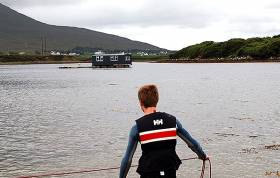Displaying items by tag: Bellacrogher
Bellacrogher Boat Club, Ireland's Only Floating Clubhouse: Podcast
Seamus Butler is, to me, a man who embodies all that is good about sailing. He has a deep love for the sport, he enjoys it and teaches those values to young sailors, building the future of sailing.
I found him after driving to the western shores of Mayo, along the side of beautiful Clew Bay, through Mulrany following the Bangor-Erris Road, Achill Island across the water, to Bellacrogher Boat Club. There I parked, walked around the side of a lake to the Bay of the Plunderer, boarded a rigid inflatable and was taken out to the most unique clubhouse/classroom in Ireland, floating on the lake with its own pontoon and training area.
To tell you more would take from the superb interview which Seamus gave me and which I urge you to listen to below.
He is a man to be admired, as are the club members who have supported the development of this unique club which this Summer hosted Mayo’s first Hobie Cat Championships. They were even listed as one of the European events of the season!
Seamus puts a lot of emphasis on safety in the training of young sailors and the value of that is underlined in another item in the programme, when the Chief Executive of Irish Water Safety criticises – and quite rightly in my opinion – that only one-fifth of the country’s primary schools are teaching swimming and the importance of safety on the water to pupils, evidently because the majority of teachers consider other sports more important. He outlines worrying statistics about the high number of anglers who have drowned and warns about the increased use of kayaks without proper training.
Completing the mix of an interesting programme, you can hear why the national museum favours wheels to support its exhibits, why brides loves the light it provides and about the Round Ireland walker who has raised €25,000 for the RNLI, as well as a bit about the history of shanties.
You’ll enjoy listening.





























































